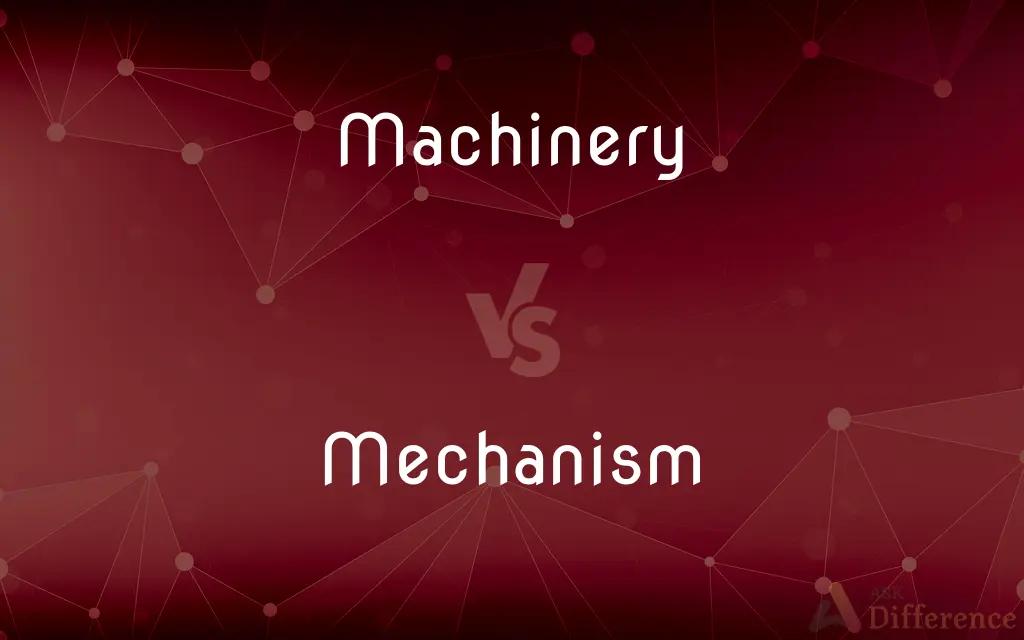Machinery vs. Mechanism — What's the Difference?
By Tayyaba Rehman & Fiza Rafique — Updated on April 27, 2024
Machinery refers to complex systems of mechanical components, while a mechanism is a single part or assembly performing a specific function.

Difference Between Machinery and Mechanism
Table of Contents
ADVERTISEMENT
Key Differences
Machinery encompasses a range of devices and systems designed to perform industrial tasks or operations, utilizing multiple mechanisms to achieve complex functionality. On the other hand, a mechanism typically refers to a single component or group of parts that work together to perform a specific mechanical function within a larger system.
Machinery is often large-scale and can include entire factories or production lines that incorporate numerous mechanisms to facilitate production processes. Whereas mechanisms are usually smaller, distinct parts of machinery, such as gears, levers, or pulleys, that convert forces and motion into useful mechanical outputs.
In terms of complexity, machinery is generally more complex, consisting of many integrated mechanisms that need to operate in synchrony for effective performance. Conversely, a mechanism is simpler, focusing on a specific task like transmitting motion or altering force magnitudes, often serving as a fundamental building block of machinery.
Regarding application, machinery is used in a wide array of fields such as manufacturing, agriculture, and construction, playing critical roles in production and operational workflows. Mechanisms, while integral to machinery, are often studied in isolation to understand fundamental mechanical principles and to innovate or improve mechanical functions within larger systems.
From a maintenance perspective, maintaining machinery involves overseeing its various mechanisms, ensuring they work together without failure. On the other hand, maintenance of a mechanism might be more straightforward, focusing on its individual components and their immediate function, which can be less daunting than managing an entire system of machinery.
ADVERTISEMENT
Comparison Chart
Definition
Systems of interconnected mechanical components
Individual parts or assemblies within machinery
Complexity
High, due to multiple integrated components
Lower, usually involves a single function
Scale
Typically large and encompassing
Smaller, specific to particular tasks
Example Components
Motors, conveyors, hydraulic systems
Gears, levers, pulleys
Primary Function
Perform broad industrial tasks
Perform specific mechanical functions
Compare with Definitions
Machinery
Equipment designed to perform specific tasks in various industries.
Heavy machinery is essential in construction sites.
Mechanism
A process or technique involved in a system's operation.
Understanding the mechanism of this tool is essential for proper use.
Machinery
Mechanical contrivances as a field of study or use.
Advances in machinery have revolutionized manufacturing.
Mechanism
A system or part of a machine serving a specific function.
The locking mechanism ensures the door remains closed.
Machinery
A system of mechanical devices or components working together.
The factory's machinery was carefully maintained to prevent downtime.
Mechanism
The means by which a device performs a mechanical operation.
The mechanism of the clock is intricate and precise.
Machinery
The operating parts of a machine.
The engineer examined the machinery to troubleshoot the issue.
Mechanism
A model or representation of a system that simplifies mechanical processes.
The students built a mechanism to demonstrate basic physics principles.
Machinery
Collectively, machines as a functional grouping.
The new plant houses cutting-edge machinery for packaging.
Mechanism
A fundamental part of a device that manipulates forces and motion.
The device's mechanism was patented for its unique design.
Machinery
Machines or machine parts considered as a group.
Mechanism
A machine or mechanical appliance.
Machinery
The working parts of a particular machine.
Mechanism
The arrangement of connected parts in a machine.
Machinery
A system of related elements that operate in a definable manner
Diplomatic and political machinery.
Mechanism
A system of parts that operate or interact like those of a machine
The mechanism of the solar system.
Machinery
A device or means of achieving or effecting a result.
Mechanism
An instrument or a process, physical or mental, by which something is done or comes into being
"The mechanism of oral learning is largely that of continuous repetition" (T.G.E. Powell).
Machinery
A literary device for bringing about an effect, such as a happy ending.
Mechanism
A habitual manner of acting to achieve an end.
Machinery
The machines constituting a production apparatus, in a plant etc., collectively.
Mechanism
(Psychology) A usually unconscious mental and emotional pattern that shapes behavior in a given situation or environment
A defense mechanism.
Machinery
The working parts of a machine as a group.
Mechanism
The sequence of steps in a chemical reaction.
Machinery
The collective parts of something which allow it to function.
All of the machinery of the law was brought to bear on the investigation.
Mechanism
(Philosophy) The doctrine that all natural phenomena are explicable by material causes and mechanical principles.
Machinery
(figuratively) The literary devices used in a work, notably for dramatic effect
Mechanism
(within a machine or machinery) Any mechanical means for the conversion or control of motion, or the transmission or control of power.
Machinery
Machines, in general, or collectively.
Mechanism
Any combination of cams, gears, links, belts, chains and logical mechanical elements.
Machinery
The working parts of a machine, engine, or instrument; as, the machinery of a watch.
Mechanism
A group of entities, such as objects, that interact together.
Machinery
The supernatural means by which the action of a poetic or fictitious work is carried on and brought to a catastrophe; in an extended sense, the contrivances by which the crises and conclusion of a fictitious narrative, in prose or verse, are effected.
The machinery, madam, is a term invented by the critics, to signify that part which the deities, angels, or demons, are made to act in a poem.
Mechanism
A mental, physical, or chemical process.
Machinery
The means and appliances by which anything is kept in action or a desired result is obtained; a complex system of parts adapted to a purpose.
An indispensable part of the machinery of state.
The delicate inflexional machinery of the Aryan languages.
Mechanism
Any process of, or system designed to manage useful energy conversion.
Machinery
Machines or machine systems collectively
Mechanism
(philosophy) The theory that all natural phenomena can be explained by physical causes.
Machinery
A system of means and activities whereby a social institution functions;
The complex machinery of negotiation
The machinery of command labored and brought forth an order
Mechanism
The arrangement or relation of the parts of a machine; the parts of a machine, taken collectively; the arrangement or relation of the parts of anything as adapted to produce an effect; as, the mechanism of a watch; the mechanism of a sewing machine; the mechanism of a seed pod.
Mechanism
The series of causal relations that operate to produce an effect in any system; as, the mechanism of a chemical reaction.
Mechanism
Mechanical operation or action.
He acknowledges nothing besides matter and motion; so that all must be performed either by mechanism or accident.
Mechanism
An ideal machine; a combination of movable bodies constituting a machine, but considered only with regard to relative movements.
Mechanism
The atomic process that occurs during a chemical reaction;
He determined unique mechanisms for the photochemical reactions
Mechanism
The technical aspects of doing something;
A mechanism of social control
Mechanisms of communication
The mechanics of prose style
Mechanism
A natural object resembling a machine in structure or function;
The mechanism of the ear
The mechanism of infection
Mechanism
(philosophy) the philosophical theory that all phenomena can be explained in terms of physical or biological causes
Mechanism
Device consisting of a piece of machinery; has moving parts that perform some function
Common Curiosities
Can a mechanism function independently of machinery?
Yes, a mechanism can function independently as it is often a self-contained component that performs a specific task.
Is a car considered machinery or a mechanism?
A car is considered machinery as it comprises numerous mechanisms working together to function.
What is the main difference between machinery and mechanism?
Machinery refers to complex systems or devices made up of various mechanisms, while a mechanism is a single component or part that performs a specific function within a machine.
What types of maintenance do machinery require?
Machinery maintenance often involves regular checks, lubrication, and replacement of worn-out mechanisms to ensure smooth operation.
How are new mechanisms developed?
New mechanisms are typically developed through engineering research, design, and testing to meet specific mechanical needs.
What is an example of a mechanism in everyday life?
A door handle is a common mechanism that uses a lever to release a latch.
What role do mechanisms play in industrial automation?
Mechanisms are crucial for automation, handling specific tasks repeatedly and precisely within industrial machinery.
How do mechanisms affect the efficiency of machinery?
Efficient mechanisms optimize the performance of machinery, reducing energy waste and increasing productivity.
How does technological advancement impact machinery and mechanisms?
Technological advancements lead to more efficient and complex machinery and mechanisms, enhancing performance and functionality.
Can the terms machinery and mechanism be used interchangeably?
While related, they are not interchangeable; machinery refers to whole systems, and mechanisms are components within them.
Are mechanisms only found in mechanical fields?
While commonly mechanical, the concept of mechanisms is also used metaphorically in fields like biology and economics to describe systems and processes.
What are the safety considerations when dealing with machinery and mechanisms?
Safety considerations include ensuring all mechanisms are properly shielded, machinery is maintained, and operators are trained to prevent accidents.
How do simple machines relate to mechanisms?
Simple machines like levers and pulleys are basic types of mechanisms that manipulate force and motion.
Can mechanisms be purely electronic?
Mechanisms are primarily mechanical, but electronic components can control mechanical actions in electromechanical systems.
What is the importance of mechanisms in mechanical engineering?
Mechanisms are central to mechanical engineering, as they are the building blocks for machines and devices.
Share Your Discovery

Previous Comparison
Total vs. Complete
Next Comparison
Converse vs. ConversationAuthor Spotlight
Written by
Tayyaba RehmanTayyaba Rehman is a distinguished writer, currently serving as a primary contributor to askdifference.com. As a researcher in semantics and etymology, Tayyaba's passion for the complexity of languages and their distinctions has found a perfect home on the platform. Tayyaba delves into the intricacies of language, distinguishing between commonly confused words and phrases, thereby providing clarity for readers worldwide.
Co-written by
Fiza RafiqueFiza Rafique is a skilled content writer at AskDifference.com, where she meticulously refines and enhances written pieces. Drawing from her vast editorial expertise, Fiza ensures clarity, accuracy, and precision in every article. Passionate about language, she continually seeks to elevate the quality of content for readers worldwide.
















































